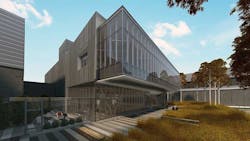Facebook Keeps Building with $800 Million Data Center in Tennessee
The COVID-19 pandemic hasn’t stopped the relentless expansion of Facebook’s data center network. Today the social networking giant said it will invest $800 million in a new data center campus in Gallatin, Tennessee, about 20 miles north of Nashville.
The announcement comes just two months after Facebook announced plans for a new data center in De Kalb, Illinois and the addition of a ninth facility at its massive campus in Prineville, Oregon. Last week the company launched operations at its campus in Henrico County, Virginia.
As is its practice, Facebook is building big and focused on sustainability.
“This 982,000 square foot campus will use 80% less water than the average data center, be LEED Gold certified, and be supported by 100% renewable energy,” Facebook said in its announcement. “As of today, we have signed contracts for 220 megawatts of new solar energy in Tennessee in support of our operations in the area. And we are planning on contracting for even more in preparation for this data center coming online.”
The solar projects are being arranged by the Tennesseee Valley Authority (TVA), which has also been a major player in provisioning renewable energy through power purchase agreements (PPAs) with Google for its data center projects in Tennessee and Alabama. Gallatin operates its own municipal utility, with a substation with capaity available for the new project.
The project is not the town’s first data center, as Archer Datacenters is nearing completion of a 5-megawatt powered shell development in Gallatin.
Gallatin’s effort to attract data center development was hailed by Facebook, and provides an example of how forward-thinking economic development strategies can provide second-tier locations with opportunities for hyperscale data center development.
“Even in a competitive environment, Gallatin stood out as a great location for a number of reasons,” Facebook said. “Community leaders have invested to ensure there is access to infrastructure and renewable energy and a strong pool of talent for both construction and operations. Most important for us, we’ve found great community partners who helped move this project forward.”
Facebook expects to create 100 full-time positions at the site, while more than 1,100 construction workers will be onsite at the peak of construction.
About the Author



